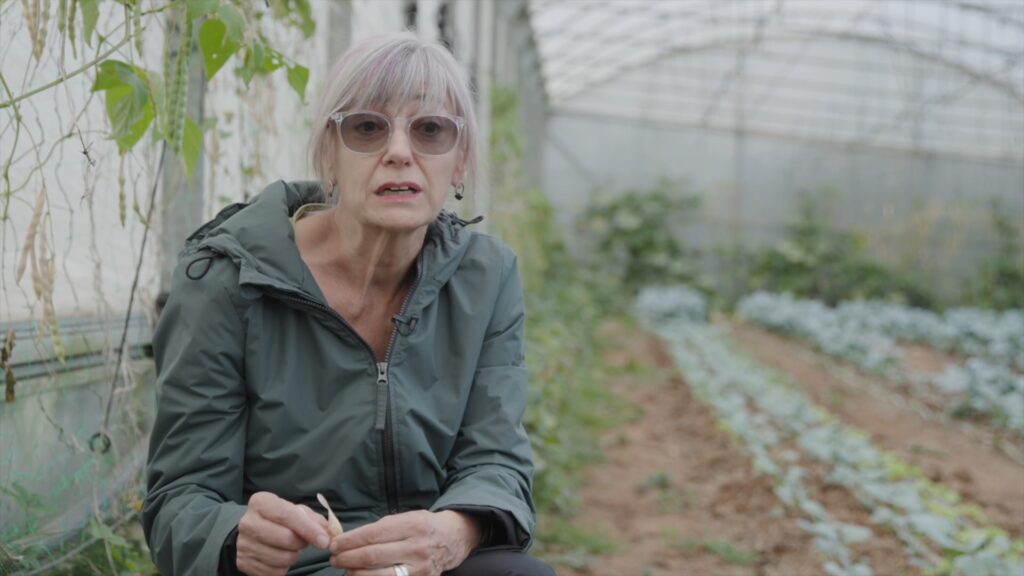
Malu Egiluz, livestock farmer with direct sales and a restaurant with family products, involved in the Artea Network (a space in the rural municipality of Artea to welcome migrants) and member of the agricultural union EHNE-Bizkaia – Areatza, Bizkaia
Malu recounts with emotion her childhood in the farmhouse, marked by a communal life deeply connected to the land. It was “a magical time”, she says, when the rhythm of life was marked by the seasons and shared rural work. However, this world began to disappear when modernisation and infrastructure displaced rural communities: “The neighbourhood collapsed, the houses there were pulled down… and my grandparents’ house was the only one left standing”.
Aware of this loss, they decided to undertake a process of recovery of the rural world from what they had: “Our cows, which were in the countryside and went to the pastures of Gorbea”. From there, they rebuilt traditional spaces such as the coal bunker and opened a small shop-bar-butcher’s, also recovering local recipes and products. Later, they integrated agriculture into a social project linked to the reception of migrants: “If someone wants to work here and stay on the land, they have a chance to get ahead with us”. Although she acknowledges that not all migrants want to return to work the land, she values the process as a way of “giving another meaning to life”.
Faced with the difficulties of rural return, Malu found a space for support and resistance in the EHNE agricultural union. Even as a child, she remembered the peasant struggles: “I remember milking the cows and then pouring out the milk”, and the protests against the prices imposed by the milk recollection stations. Later, when she returned to the farm, the rural world seemed to her “quite dead”, and it was the agricultural union that offered her community and training, especially through the women. Unionisation also made her aware of the global dimension of rural problems: “the production of large extensions, soya monocultures, eucalyptus plantations… and how peasants lose their land”. For Malu, peasant struggles are also social struggles: “if we don’t produce, we have seen how dependent we can be” on a globalised food system that is disconnected from the land.
Malu highlights the central role that women have played in peasant struggles, both locally and in international spaces such as La Via Campesina. From her experience, she affirms that “women are the driving force, from feminism and practical knowledge”, and she is committed to “this small, agroecological model, not from those large extensions”. She contrasts this model with the policies that have historically favoured agricultural industrialisation, which, according to her, “did not lead them to the right place”, especially for small farmers in the Basque Country.
Although she recognises advances such as the inclusion of women in the trade union and the approval of the Statute of Women Farmers, Malu is critical of the real scope of these measures. She points out that “women farmers have always been in the shadows” and that, although there is now a “gender vision in the agricultural union”, “there are still many things to iron out”. She also denounces the fact that agricultural policies such as the CAP have been designed “for the big ones, not for the small ones”, leaving out those who farm on small extensions, such as many women farmers.
For Malu, being a woman and a farmer implies resisting multiple difficulties: “It is difficult to be a woman and a farmer”, she says, especially when access to land is limited and costly. She also criticises the dominant model of consumption: “The biggest attacks of this system are the supermarkets”, where “I wouldn’t say there is food, behind that there is another trade”. In the face of this logic, she calls for agriculture that guarantees “food security” and healthy, local food.
Finally, she reflects on the loss of “peasant time”, that more leisurely rhythm of life connected with the environment. She laments that the current system “has stolen our time” and denounces the fact that “we are always filling up time” instead of living it to the full. Faced with the generational disconnection, she insists on the need to recover ancestral knowledge and to promote local policies that are committed to living and sustainable agriculture: “We have to recreate… our spaces were not full of pine trees”. Despite the obstacles, Malu remains hopeful that “we are not going to disappear as has been pretended”.
